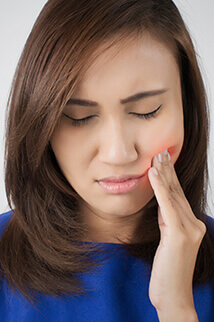TMJ Therapy Fights Johnson & Fayetteville Jaw Pain
 Do you struggle with a neuromuscular condition like temporomandibular joint (TMJ) dysfunction? Both bruxism and TMJ dysfunction can have a destructive, aggravating effect on the temporomandibular joints that are located near your ears. These joints have the important job of connecting the jaw to the bottom of your skull. They also allow you to open and close your mouth comfortably. When they become distressed, you can experience painful symptoms like headaches, earaches, and pain in the neck, back or shoulders. Thankfully, relief is possible with oral appliance therapy.
Do you struggle with a neuromuscular condition like temporomandibular joint (TMJ) dysfunction? Both bruxism and TMJ dysfunction can have a destructive, aggravating effect on the temporomandibular joints that are located near your ears. These joints have the important job of connecting the jaw to the bottom of your skull. They also allow you to open and close your mouth comfortably. When they become distressed, you can experience painful symptoms like headaches, earaches, and pain in the neck, back or shoulders. Thankfully, relief is possible with oral appliance therapy.
What Is Bruxism?
Bruxism patients struggle with unconscious teeth grinding and clenching, in most cases as a response to stress. What’s more, bruxism patients have more difficulty while they’re asleep than they do while they’re awake. That’s why one solution for bruxism is a nightguard, an oral appliance worn during sleep that helps patients protect teeth and ease symptoms. If left untreated, bruxism leads to worn or severely damaged teeth, TMJ dysfunction, and other complications, like depression, eating disorders, and insomnia.
What Is TMJ Dysfunction?
TMJ dysfunction (TMD) is an uncomfortable neuromuscular condition caused by untreated teeth grinding or pressure from an uneven bite. In addition to experiencing frequent headaches or earaches, patients with TMD may also experience jaw clicking or difficulty opening their mouths.
As with bruxism, an oral appliance is the best method for treating TMD. Your oral appliance will corrects your bite, easing symptoms. For some patients, orthodontic treatment may be advised.


